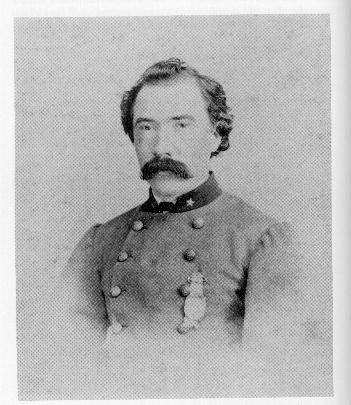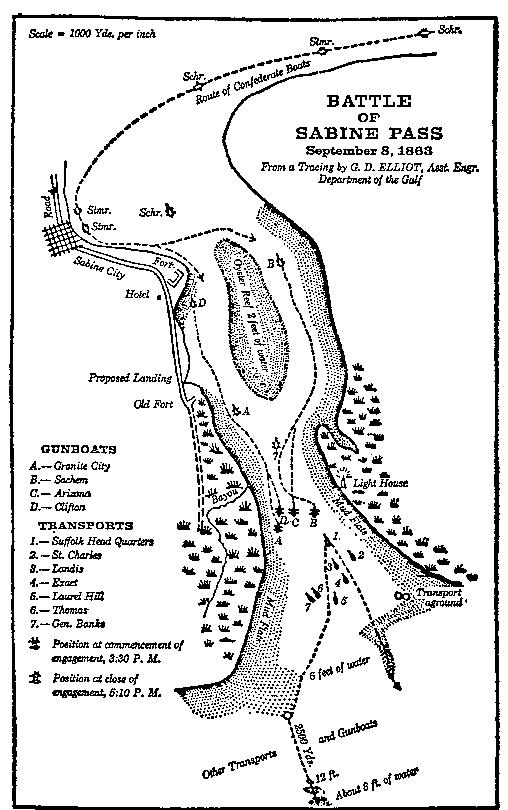Confederate Lt. Dick Dowling
and the
Battle of Sabine Pass, Texas
September 8, 1863
Sponsored by the:
Dick Dowling Camp # 1295
Sons of Confederate Veterans
Beaumont, Texas


Information about the Civil War Battle of Sabine Pass
 History of Lt. Dick Dowling and the Battle of Sabine Pass
History of Lt. Dick Dowling and the Battle of Sabine Pass
 Biography of Lt. Richard W. Dowling
Biography of Lt. Richard W. Dowling
 History of the Monument erected for the Confederates at Sabine Pass
History of the Monument erected for the Confederates at Sabine Pass
 The Medals Presented to the Veterans of the Battle of Sabine Pass
The Medals Presented to the Veterans of the Battle of Sabine Pass
 Read Lt. Dowling's Report Regarding The Battle of Sabine Pass
Read Lt. Dowling's Report Regarding The Battle of Sabine Pass
 Union Soldiers Account of the Battle of Sabine Pass
Union Soldiers Account of the Battle of Sabine Pass
 Read articles related to the Battle of Sabine Pass
Read articles related to the Battle of Sabine Pass

Information about the Dick Dowling Camp #1295 SCV
 Information about the Dick Dowling Camp
Information about the Dick Dowling Camp
 Information about the THE BATTLE OF SABINE PASS RE-ENACTMENT Observing the Battle's 150th ANNIVERSARY.
Information about the THE BATTLE OF SABINE PASS RE-ENACTMENT Observing the Battle's 150th ANNIVERSARY.
 Magnolia Cemetery Dedication of A.S.Johnson Camp No.75 U.C.V. Plot, Beaumont, Texas.
Magnolia Cemetery Dedication of A.S.Johnson Camp No.75 U.C.V. Plot, Beaumont, Texas.
 E-Mail the Dick Dowling Camp #1295: attn. Micheal McGreevy, Adjutant
E-Mail the Dick Dowling Camp #1295: attn. Micheal McGreevy, Adjutant
 E-Mail the Webmaster: attn. Bruce A. Hamilton
E-Mail the Webmaster: attn. Bruce A. Hamilton

Battle of Sabine Pass
On September 8, 1863, at Sabine Pass, Texas, Lt. Richard W. Dowling and the
Davis Guard defeated the forces of General Nathaniel P. Banks and Admiral G.
Farragut under the command of General William G. Franklin in a Confederate
victory described by Jefferson Davis as being "without parallel in ancient or modern
warfare".
With the fall of confederate defenses at Vicksburg on July 4, 1863, and soon after
Port Hudson, the authority of the Mississippi Valley by Union forces had been
established. These victories made available equipment and seasoned combat troops
for a Texas expedition.
General Banks, commander of the Department of the Gulf, placed 15,000 men for
this campaign under the immediate command of General Franklin who sailed
August 19, 1863, from New Orleans with 5,000 soldiers on 18 transports of
various types. The westward bound convoy was escorted by four heavily armed
gunboats; the Clifton, Sachem, Arizona and Granite City. Franklin was to sail up
the Sabine Pass, land in the vicinity of Sabine City, advance to Beaumont seizing
the railroad and take Houston and Galveston from the North. The additional
10,000 men left in reserve would be brought from New Orleans to overcome all
resistance in Texas.
The poorly defined Union rendezvous at the mouth of Sabine Pass was discovered and
the act of surprise was lost. By September 6, the Confederate defenders knew a large
Union force was approaching and although the Davis Guard had permission to
withdraw, they decided to defend the earthen fort. Because Captain Odlum was
acting as area commander in Sabine City, actual command at Fort Griffin fell to his
young lieutenant, Richard W. (Dick) Dowling.
The defending Confederates watched the Union gunboats advance up the Pass during
the night of September 7. Next morning the Union guns shelled Fort Griffin, but
Dowling withheld his fire until mid-afternoon when the attacking Sachem was only
1200 yards away. With one of their first rounds, the Davis Guard disabled the
Sachem and then shifted fire to the Clifton. In 45 minutes the two vessels surrendered
and the remaining Union gunboats and transports fled in panic to the Gulf and to New
Orleans. The Davis Guard suffered no casualties; the invading forces lost about 50
killed and 350 prisoners.
The incredible success of the Davis Guard gave heart to the Confederate forces.
Dick Dowling and his men received commendation from their commanding generals,
the Confederate Congress and President Davis. Texas remained an active state in the
Confederacy.




There have been  visitors to this page since May
31, 1998
visitors to this page since May
31, 1998
Last Updated on 23 December 2004


 History of Lt. Dick Dowling and the Battle of Sabine Pass
History of Lt. Dick Dowling and the Battle of Sabine Pass
 Back to the Top
Back to the Top